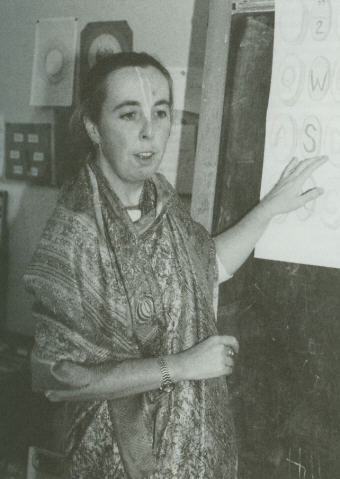
Sita Devi Dasi
Srila Prabhupada accepted women disciples lovingly into the familial embrace of his Hare Krsna movement, engaging us and encouraging us in all different types of service. He made us feel wanted and useful; we were devotees assisting in his endeavor to present Krsna to the world.
But something happened along the way to change ISKCON's perception of our role. It happened, I think, around 1975 or 1976, when our leaders were trying to relieve Srila Prabhupada of the burdens of management and free him to concentrate on hisSrimad-Bhagavatam translation.
ISKCON began adopting new rules, those rules Pranada Prabhu talks about. Some rules were timeless guidelines for asrama life. Others, I'd say, were immature ways for twenty-year-old Westerners to handle their new attempts at celibacy.
Perhaps because it's hard for neophytes to distinguish their new spiritual realizations from their old material attitudes, some men found it easy to justify what we women joked about as the "mean swami syndrome."
And we women were emotionally and spiritually immature ourselves. We did not fully understand our roles, so we often accepted models of behavior that were not what Srila Prabhupada intended.
It's difficult for embryonic spiritual aspirants to perceive themselves as anything other than advanced. So we ISKCON devotees institutionalized patterns of behavior that to some extent made our family relationships dysfunctional.
What we need now, I suggest, are opportunities for Srila Prabhupada's disciples—men and women—to meet and formally discuss these issues so that our lines of dialogue and communication can open.
Now, wiser, I hope, both from age and from spiritual maturity, we can retrace our steps, recognize mistakes we've made along the way, and set things right.
Then, by our example we will be able to show the younger devotees Srila Prabhupada's original idea of a house in which the entire world can live.
As Srila Prabhupada fanned our infinitesimal sparks of devotional enthusiasm, we too must learn to appreciate one another's service to Srila Prabhupada, regardless of how inadequate that service might be.
As our Society develops, we should make sure it protects women from serious social neglect, makes it hard for men to abandon their wives and children, and provides support for women and children who need it. We should provide counseling to help devotees keep their marriages together, and we should see to it that devotees take their vows of marriage and sannyasa most serIously, in general ensuring that we never leave women unprotected.
I think I speak for many women who feel inclined to accept our role of being protected by men, who we in turn are inclined to serve. I don't want to usurp the managerial roles men have in our movement. I'm just searching for a clearer definition of my role within ISKCON.
Sita Devi Dasi, a devotee for twenty years, began her service as a cook in ISKCON's Buffalo temple. Her husband took sannyasa when she was 25. Since then she has served all over the world, in book publishing, book distribution, and worship of the Deity. For the last ten years she has taught in ISKCON's gurukula schools in Vrndavana and Europe. She now teaches at Bhaktivedanta Manor, near London.
